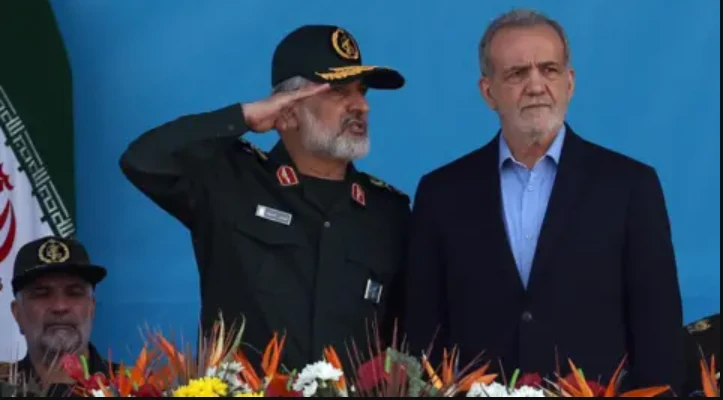Iran's 'serious dilemma' after Hezbollah chief killing

Stay tuned with 24 News HD Android App

Israel's killing of Hezbollah leader Hassan Nasrallah has given Iran a serious dilemma -- how to cope with the loss of a crucial ally and still maintain its regional influence.
Lebanon's Hezbollah group, which has long been armed and financed by Iran, on Saturday confirmed Nasrallah's death after Israel said it had "eliminated" him in an air strike on Beirut's southern suburbs.
His death was a sharp escalation in nearly a year of tit-for-tat cross-border exchanges between Hezbollah and Israel since the Gaza conflict began, and risks plunging the entire region into a wider war.
Iran's supreme leader Ayatollah Ali Khamenei vowed Nasrallah's death "will not be in vain", and First Vice President Mohammad Reza Aref said it would bring about Israel's "destruction".
Iran also vowed to avenge the killing of Revolutionary Guards General Abbas Nilforoushan, who died alongside the Hezbollah leader.
"Nasrallah has been crucial to Iran's power expansion," said Karim Sadjadpour of the Carnegie Endowment, noting that Hezbollah remains "the crown jewel" of the Islamic republic's regional allies.
His killing "has not altered the fact that Iran still does not want to get directly engaged" in the ongoing conflict, said Ali Vaez of the International Crisis group.
But it left Iran with "a serious dilemma", said Vaez, especially that the group's deterrence regarding Israel was now "in complete disarray".
Economic crisis
For Tehran-based international relations professor Mehdi Zakerian, developments have shown that the Iran-aligned resistance front "was not only unable to contain Israel, it also suffered serious blows".
Nasrallah's death came around two months after Palestinian group Hamas's political chief Ismail Haniyeh was killed in late July in Tehran where he had attended President Masoud Pezeshkian's inauguration.
Iran blamed Israel for his death and vowed to retaliate.
Zakerian says rebuilding Hezbollah will be no small feat for Tehran amid its mounting economic challenges.
"If the government wants to get involved in reconstructing Lebanon or re-equipping Hezbollah, it will aggravate Iran's economic crisis," he said.
Iran has been reeling from the economic impact of international sanctions, which have contributed to soaring inflation, high unemployment and a record low rate for the Iranian rial against the US dollar.
Pezeshkian's government has boosted efforts to help ease the crippling sanctions and revive a 2015 landmark nuclear deal which collapsed when the United States unilaterally withdrew from the accord three years later.
Analysts have said Iran has been treading carefully since the outbreak of the Gaza conflict, trying to project power without provoking a US response.
Even during its first-ever direct attack on Israel in April -- retaliation for an air strike on Tehran's embassy annex in Damascus -- most projectiles were intercepted by Israeli defences or allied forces.
Iran said at the time it had informed the United States and given neighbouring nations a 72-hour warning before what it called its "limited" attack on Israel.
Still, Vaez said Iran "has every interest in trying to preserve whatever remains of Hezbollah. Hezbollah is Iran's shield."
"I don't think Iranians would give up on almost 40 years of investment in this project overnight because a dozen people were eliminated," he added.
'Weak and meagre'
And "Iran cannot abandon Hezbollah, because in that case it would also lose its other allies", said Zakerian.
Iran-backed militant groups in Syria, Lebanon, Iraq, and Yemen have all become involved in rising regional tensions since the Israel's war against Hamas erupted.
Another strong dilemma Iran may face is communicating with Hezbollah and the transfer of weapons, analysts say.
On Friday, Israel's military vowed to prevent Iran from supplying Hezbollah with weapons via Beirut airport, saying its fighters were patrolling the skies above.
"It is too late now for Iran to support Hezbollah with weapons," said political commentator Mossadegh Mossadeghpour.
But he said he believes the group "will repair itself as it has done in the past".
Hezbollah's internal communications were also dealt a heavy blow when sabotage attacks this month targeted members' pagers and walkie-talkies.
Vaez believes it would be "very difficult" for the Iranians to communicate now with their allies, unlike during the 33-day war in 2006 between Israel and Hezbollah.
He said Hezbollah's "weak and meagre" responses have been noted as the violence with Israel has escalated.
"The question is whether they are unwilling or unable to take action," he said.
Vaez maintains that Iran appears to be hoping that Hezbollah will "get its act together ... and mount a significant attack on Israel to demonstrate it's still standing."
